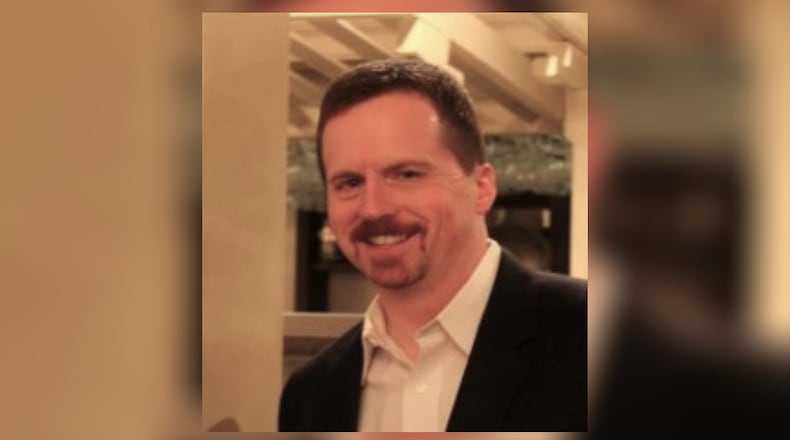The orchard is where Robert E. Lee positioned his artillery to fire on the Union position before Pickett’s disastrous charge up Cemetery Ridge, a move many contended was the mistake that cost the South the war.
It’s also ground taken earlier — and contrary to direct orders — by a Union corps commander who was in the orchard that day rather than prison because he had been found not guilty by reason of insanity of in the killing of a son of Francis Scott Key, author of “The Star-Spangled Banner,” on a Washington, D.C. Street.
O, say, can you see why there might be interest in the 2024 Civil War Symposium, scheduled from 9 a.m. to 4 p.m. March 2 at the Clark County Heritage Center?
Licensed Gettysburg Battlefield Guide Britt Isenberg, co-author of the 20190 book “Gettysburg’s Peach Orchard,” will delve into fight for the site, which included the hottest artillery exchange of the war, a measure of Lee’s assessment of the position’s importance.
Isenberg brought to the book what he had learned in writing “The Boys Fought Like Demons,” a regimental history of the 105th Pennsylvania Infantry, for which a monument stands at Gettysburg.
Witnessing History president Kent Masterson Brown returns to the symposium to assess Union Gen. George Meade’s view of not only the Peach Orchard but the wider battle and its aftermath, during which President Abraham Lincoln fumed over what he saw as Meade’s failure to destroy Lee’s defeated army. Brown is of the opinion that, on this matter, the late president is on the wrong side of history.
Aside from Steve and Lisa Ball, whose Civil War era music is by now a symposium staple, that leaves James Hessler, Britt’s fellow licensed Battlefield Guide at Gettysburg He co-wrote about the Peach Orchard book with him; and co-wrote another on “Pickett’s Charge at Gettysburg”. But Hessler will focus Daniel Sickles, who wrote a book about the exonerated murderer who not only ignored Gen. George Meade’s orders at the Peach Orchard but complicated the general’s plans to discipline him by getting a leg shot off in the ensuing fight during a show of valor that earned him the Medal of Honor.
In approaching “Sickles at Gettysburg,” winner of both the Bachelder Coddington Award and the Gettysburg Civil War Roundtable Distinguished Book Award, Hessler knew the general opinion expressed here by the American Battlefield Trust: that “few figures of the American Civil War are more dubious than Daniel Edgar Sickles” due to “his self-motivated actions on and off the battlefield.”
“He is described as a scoundrel (and chronic womanizer), and I do think there is some truth in that,” Hessler said in a recent interview. He went on to describe him as “somebody you would not want to trust with your grandmother’s life savings”; noted that he came up through the corruption of New York City’s infamous Tammany Hall; and added that “when he had to” Sickles would “use the newspapers to destroy his enemies.”
Hessler goes so far as to describe Sickles as the “O.J. Simpson of Gettysburg” – both because he was absolved of murdering his wife’s lover and because of the 1850s “Dream Team” of lawyers that defended him. At its head was Steubenville, Ohio-born Edwin Stanton, who, two years after the successful defense became Abraham Lincoln’s Secretary of War.
On the other hand, Hessler says, Sickles later in life was “devoted to battlefield preservation” — particularly at Gettysburg — and veterans’ affairs. And while those efforts can be seen as a scheme to burnish his own reputation enough to get a street named for him at Gettysburg, Hessler’s sense is that there’s more to it.
“This was a guy who was on the American stage for more than 60 years of his life, whether it was law, politics Civil War. A lot of important people who knew him did not the (he) was an idiot.”
Arguably, the list includes both Lee and Confederate Gen. James Longstreet, who were of a mind with Sickles about the high ground of the Peach Orchard – and Abraham Lincoln, who sent Sickles South for an assessment of the effects of slavery and asked his opinions on national reconstruction.
“Very often his temperament and his own personality would get the better of him” and he would “go down in flames,” Hessler said.
In an interview with American Heritage, Hessler said the premise of his book “is that when you combine Sickles’ battlefield and post-battle actions, no individual in Gettysburg’s history has more combined influence. It is up to the readers to decide if that influence is good or bad.”
Hessler does ask that those doing so at the March 2 symposium do so “thinking only of what the participants knew at the moment they made their decisions.”
“These people were on the ground for the first time in their lives, they’re hot, tired and under stress, and (unlike historians and history buffs) they haven’t spent 160 years studying the battle.”
How to go
Springfield Civil War Symposium
9 a.m. to 4 p.m. Saturday, March 2
Clark County Heritage Center
Cost: $70, $50 for Heritage Center members
Online registration at https://cutt.ly/cws24
Questions: 937 324-0657
About the Author

